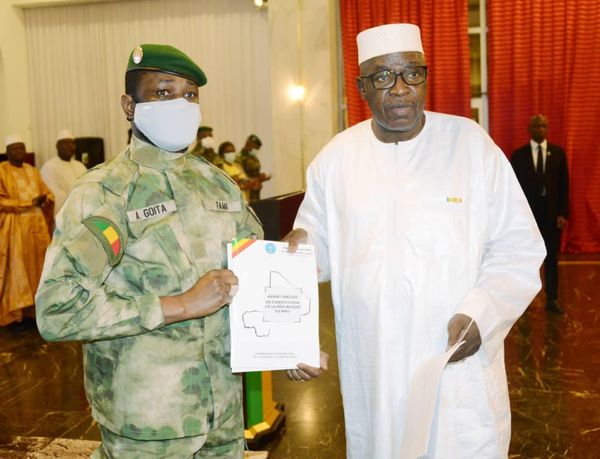The Commission for the Drafting of the New Constitution (CRNC) in Mali has handed over the preliminary draft of the fundamental law to the president of the transition.
Mali is heading towards major institutional changes if the draft constitution, submitted on Tuesday 11 October to Colonel Assimi Goita, president of the transition, is adopted at the end of the referendum scheduled for March 2023.
“The draft includes 195 articles that are in line with African constitutions,” said CRNC chairman, Fousseyni Samaké.
According to him, “this increase can be explained by the complexity of the world, the multiplication of actors and the major issues.”
The draft, which took two months to write through “consultations with the nation’s active forces,” will also see major innovations in form.
“There have been reformulations of articles,” said Samaké as he was speaking on national television ORTM.
But according to the former Secretary General of the government, “it is especially on the substance that the most important improvements” have been made.
“There is a clear affirmation of the unitary character of the state. This implies that there is no question of us having a federal state,” said the president of the CRNC.
In this preliminary draft, there is also “a development on the concept of the secular republic.”
He said the Malian concept of secularism is defined in the new constitution, adding that the Court of Auditors will be added to the judicial institutions, in accordance with the requirements of the West African Economic and Monetary Union (UEMOA).
Regarding institutions, the chairman of the CRNC said that the Economic, Social and Cultural Council will be called the Economic, Social, Cultural and Environmental Council, while legislative power will be embodied by the parliament, which will include two chambers: the National Assembly and the High Council of the Nation.
On the other hand, the High Court of Justice and the High Council of Communities will disappear from the list of institutions.
In the first draft presented to the Malian leader, major changes in the distribution of powers between the President of the Republic and the Prime Minister were noted.
“In the current constitution, it is said that it is the government that determines the policy of the nation. With the new Constitution, it is the president who determines the policy of the nation and the government will be responsible for its execution,” said Fousseyni Samaké.
He said “this change comes to clarify the fact that the determination of the policy of the nation is the responsibility of the president of the Republic.”
Under the draft the National Assembly loses the power to remove the government.
Conversely, the President of the Republic will no longer be able to dissolve the National Assembly.
However, the draft bill has “instituted a procedure for the dismissal of the high authorities of the Republic”.
Presidents, the National Assembly and the High Council of the Nation can be deposed when they are no longer able to meet the requirements of their functions, said Fousseyni Samaké.
The transitional authorities have made these reforms one of their priorities, alongside the restoration of security in parts of the country where activity is linked to jihadist groups allied to Al Qaeda or the Islamic State.
AC/lb/as/APA


